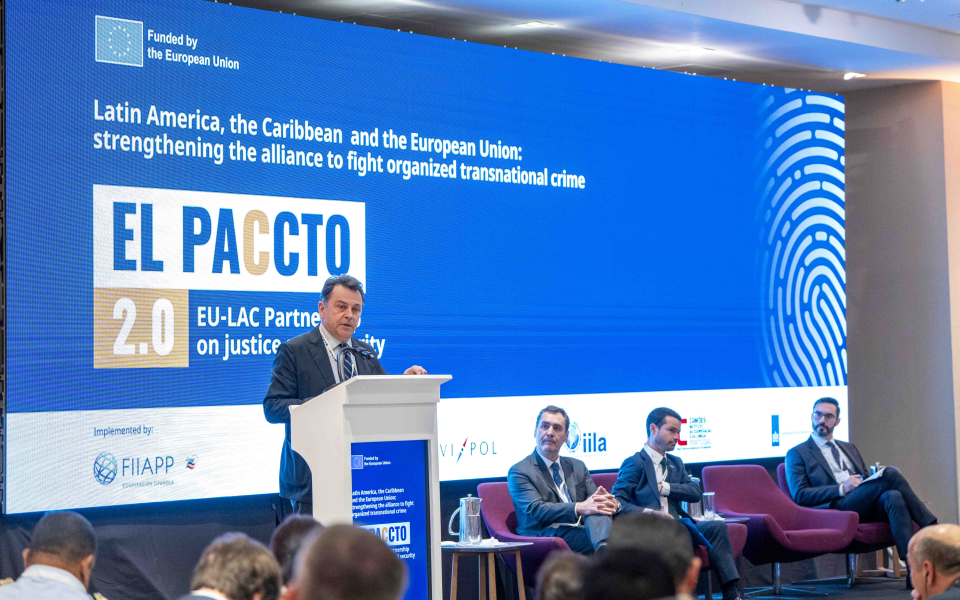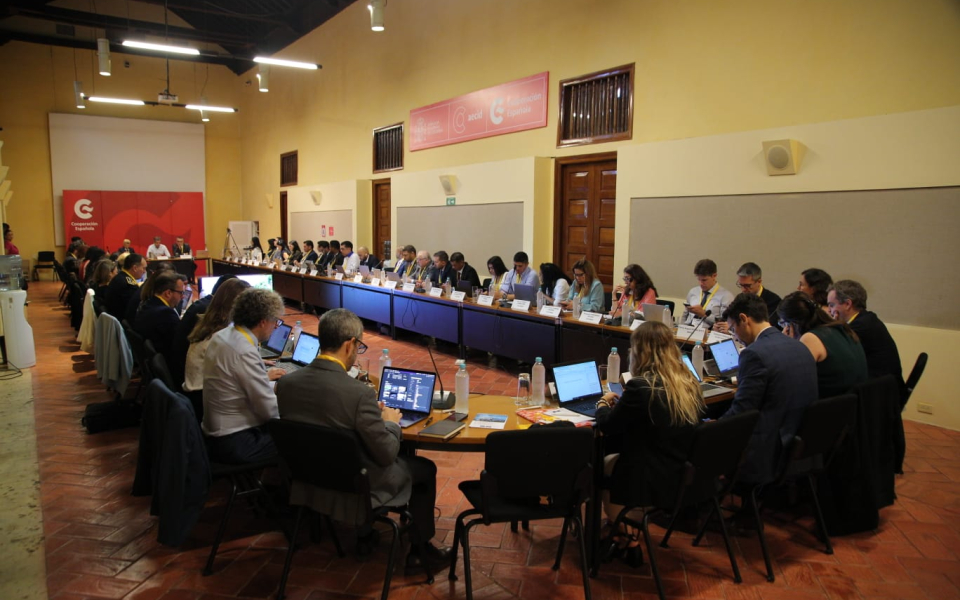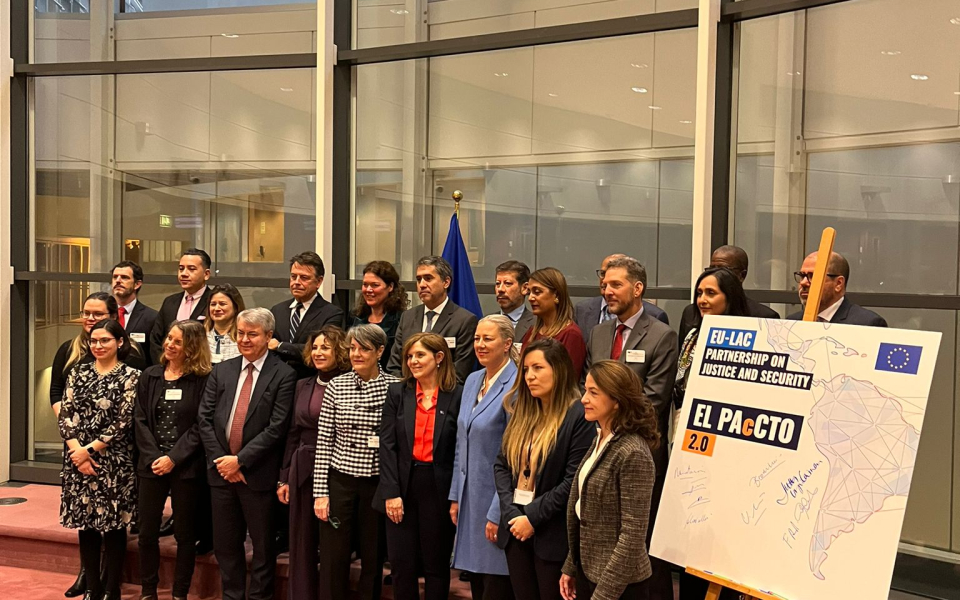EL PAcCTO 2.0 - Programme d'Assistance contre le crime transnational organisé en Amérique Latine et les Caraïbes
L'objectif général de cette action, conformément à l'IEE pour la justice et la sécurité pour l l'UE et l'Amérique latine, est d'établir un partenariat efficace entre l'UE et l'ALC sur le renforcement de l'État de droit et la lutte contre la criminalité organisée l'État de droit et la lutte contre la criminalité organisée, en favorisant la sécurité et la stabilité des citoyens, tant en ALC qu'en Europe.
Objectifs spécifiques
1. Consolider et renforcer les structures et mécanismes de coopération en matière de justice et de sécurité dans la région ALC et dans la région UE-ALC et mécanismes de coopération en matière de justice et de sécurité ;
2. Renforcer la capacité globale de l'ALC en matière d'État de droit et de justice pénale renforcer la capacité des institutions de l'ALC à lutter contre la criminalité transnationale organisée, en mettant notamment l'accent sur les préoccupations spécifiques des femmes et des jeunes l'accent sur les préoccupations spécifiques des femmes et des jeunes ;
3. Relever les défis spécifiques des principaux marchés criminels transnationaux de l'ALC (trafic de stupéfiants, d'armes à feu, d'êtres humains et de biens culturels ; criminalité environnementale et cybercriminalité)
Le projet en chiffres
53,3 M €
Budget total pour le Programme
Chronologie
-
26 février 2026
Début du projet
-
20 novembre 2023
Signature du Contrat
Signature du contrat à Bruxelles
-
11 mars 2024
Reunion du Lancement à Panama
New means to fight transnational crime between the EU and Latin America and the Caribbean with the launch of EL PAcCTO 2.0 Following the launch of the agreement on EL PAcCTO 2.0 in November 2023, today the new programme to combat transnational crime was officially launched in Panama City. The new programme will further enhance cooperation on justice and security between Latin America, the Caribbean, and the European Union. With European funding of 58.8 million euros, the program will operate until the end of 2027 and focus on strengthening the rule of law and combating organised crime in the region. Commissioner for International Partnerships, Jutta Urpilainen: “EL PAcCTO has successfully brought European and Latin American partners together in the fight against organised transnational crime. As a key deliverable of the EU-CELAC Summit of July 2023, I am delighted that this new phase, which will now include our Caribbean partners, will boost our joint investment and commitment to the rule of law, increase the capacity of criminal justice systems and respond appropriately to the different types of crime - including human trafficking, the international drug trade and cybercrime.” Panama's Deputy Minister of Public Security: “Combined and concentrated efforts are essential to address common security threats. That is why we reiterate our determination to continue working together for the benefit of dialogue between the two sides”. The Portuguese Minister of Justice: “The launch of EL PACCTO 2.0 is a very clear sign of the commitment to multilateralism. The first phase of EL PACCTO was very relevant in terms of cross-border, trans-regional and international strengthening and consolidation around the joint needs of prevention and combating organised crime”. EL PAcCTO 2.0 represents an important change from its predecessor, with a doubling of its budget and expanding its structure to achieve more sustainable and far-reaching results. One of the key innovations of this phase is the inclusion of Caribbean countries, reflecting a commitment to promote multi-regional dialogue and cooperation in the fight against organised crime. The programme will be implemented by an EU Member State Consortium led by FIIAPP (Spain), together with its partners from France (Expertise France and Civipol), Italy (IILA), Portugal (Camões) and the Netherlands. The launch event featured several high-level meetings, including the Latin American Committee on Internal Security (CLASI) Ministerial Meeting and the EU-Latin America Joint Justice Policy Cycle. These gatherings provided a platform for the development of public policies aimed at tackling specific crimes such as cybercrime, human trafficking, firearms trafficking, environmental crimes, and drug trafficking. EL PACCTO 2.0 will adopt a comprehensive approach to the fight against organised crime through three main lines of action: strategic, institutional, and operational. This approach will enable the program to work in a more specialised, in-depth, and coherent manner and ensure that efforts are effectively coordinated and impactful. Background on EL PAcCTO The first phase of EL PAcCTO was configured as an ambitious regional and trans-regional cooperation programme called to make a difference in the political, institutional, technical and operational fields, to the fight against organised crime along the entire criminal chain, with a comprehensive approach and perspective.
-
20 mai 2024
Regional Workshop on Cybercrime Protocol Implementation Held in Cartagena de Indias
Cartagena de Indias, Colombia — In a significant move towards enhancing international cooperation on cybercrime, the GLACY-e joint project of the European Union and the Council of Europe has partnered with the EL PACCTO 2.0 programme to facilitate discussions on the implementation of the Second Additional Protocol to the Budapest Convention in Latin American countries. The regional workshop, held from May 20-22, 2024, was hosted by the Spanish Agency for International Cooperation or Development (AECID) at the Training Center of the Spanish Cooperation in Cartagena de Indias. The Budapest Convention, formally known as the Convention on Cybercrime, along with its Second Additional Protocol, provides the most comprehensive international tools for effective cooperation among criminal justice authorities to combat cybercrime and obtain electronic evidence related to any crime. The Protocol, opened for signature in May 2022, aims to further enhance international cooperation and facilitate cross-border access to electronic evidence in criminal investigations, while ensuring robust safeguards for human rights and the rule of law. As countries await the Protocol’s entry into force, they must align their national laws with its provisions and ensure that their institutional frameworks are prepared to implement the required responsibilities. This alignment is crucial for creating a consistent and effective legal environment for combating cybercrime. Latin America has shown significant engagement with the Protocol. Five countries in the region have already signed, and more are in the process of doing so. The workshop in Cartagena de Indias brought together over 50 representatives from Latin American countries, including Argentina, Chile, Colombia, Costa Rica, Dominican Republic, Brazil, Ecuador, Paraguay, Panama, and Peru. These representatives, along with international experts from both the GLACY-e and EL PACCTO 2.0 projects, engaged in in-depth discussions on the Protocol’s provisions and other international instruments and regional judicial and police networks aimed at combating cybercrime. The event served as a platform for participants to exchange views on the practical implementation of the Protocol, explore the options it offers, and discuss the necessary legislative reforms at the national level. This regional workshop is the first in a series of events designed to support countries that have signed or are in the process of signing the Protocol. These events aim to address the challenges and explore possible solutions for the Protocol's implementation at the national level. Overall, the workshop highlighted the importance of international collaboration and legal harmonization in the fight against cybercrime. The discussions and outcomes of this event are expected to significantly contribute to strengthening the legal and operational frameworks required to combat cybercrime effectively in the Latin American region.
À propos du projet
Statut du projet
En cours
Type de financement
Union Européenne
Type de contrat



